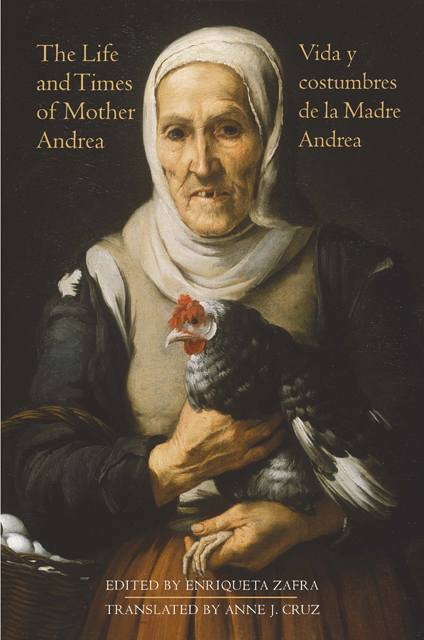Introduction
Published online by Cambridge University Press: 14 February 2023
Summary
The anonymous picaresque novella Vida y costumbres de la madre Andrea (ca. 1650) has to my knowledge only one extant edition, which was published by the late distinguished Hispanist Jonas A. Van Praag (1895–1969) in the literary journal Revista de Literatura in 1958. Van Praag discovered the manuscript in 1950 in a store of antique books in the city of Utrecht, Netherlands. The text consisted of 146 unnumbered pages, which later were bound in parchment and catalogued in French.
In his introduction to the published manuscript, Van Praag summarizes the anonymous novella, dating it to approximately 1650 on the basis of the literary references made in the text. Among these are allusions to works by Spanish authors Alfonso de la Torre, Luis de Góngora, Francisco de Quevedo (there are explicit references to El buscón), Juan Pérez de Montalbán, and to the Portuguese converso or Jewish convert Antonio Enríquez Gómez. He also mentions his efforts in analyzing the paper of the manuscript, especially the last page, which has a watermark representing a coat of arms between two gryphons. After consulting with experts, he concluded that it was a popular design of Italian provenance but imitated in France, Spain, and Portugal. This led him to date the paper from the eighteenth century, and thus to surmise that the manuscript found was probably a reproduction of the original (Van Praag 112). Taking as a reference Van Praag’s excellent analysis, in my introduction I review his findings as well as adding new information and possibilities regarding the manuscript’s provenance, its contents, and its highly unusual linguistic practice.
Van Praag comes to the conclusion that the manuscript belongs to the genre of the picaresque novel and that the unknown author is probably a Sephardic Jew, likely from the Amsterdam Sephardic community. Nevertheless, he notes that the action of the story is set in Spain and that, although there is no mention of geographical names, the reality described and the characters presented are clearly Spanish. He also notes that all the references to the Bible are from the Old Testament and that the unknown author was very knowledgeable of the literature in vogue, especially picaresque novels.
- Type
- Chapter
- Information
- The Life and Times of Mother AndreaLa vida y costumbres de la Madre Andrea, pp. 1 - 24Publisher: Boydell & BrewerPrint publication year: 2011



